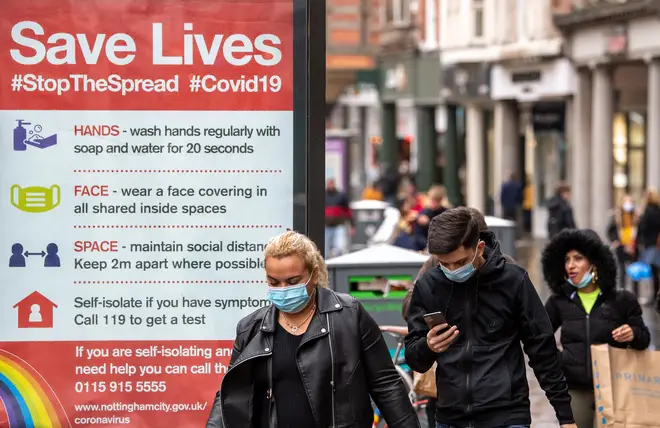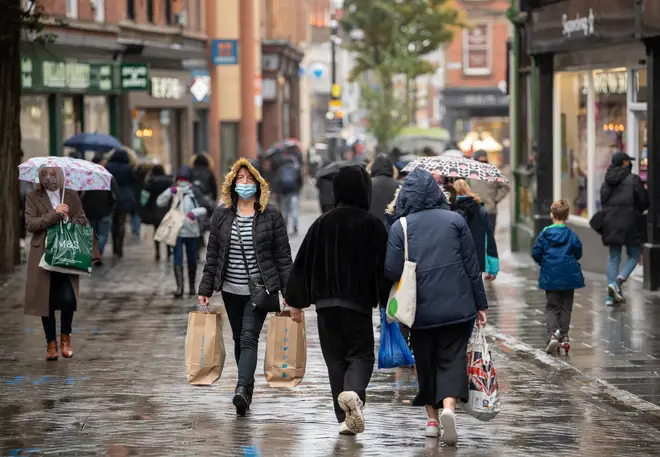
Ian Payne 4am - 7am
28 October 2020, 11:57 | Updated: 28 October 2020, 13:09

Government scientific advisers have warned Boris Johnson that Britain faces a second wave of coronavirus more deadly than the first.
The Prime Minister is under growing pressure to impose tougher curbs after daily Covid-linked deaths hit their highest level since May, with the UK’s total toll thought to have topped 60,000.
Sage, the UK Government’s scientific advisory group, has presented Downing Street with modelling that forecasts the second wave sweeping Britain will peak lower but last longer, according to The Telegraph.
Read more: 'Too early to say' how Covid lockdowns could affect Christmas, Cabinet minister tells LBC
Read more: Police leader sparks backlash after suggesting police could break up Christmas gatherings
This could mean that high daily death tolls continue throughout the winter months, and peaking at 500 within weeks without drastic action.
Sir Patrick Vallance, the chief scientific adviser, is said to be leading intense lobbying on ministers to tighten the current wave of restrictions.
Sage has warned separately that all of England will need to be under tier three lockdown restrictions by mid-December if Boris Johnson’s aim for a normal Christmas is realised, the paper reported.

Environment Secretary George Eustice told LBC on Wednesday morning that it was “too early to say what restrictions will be in place by Christmas” and families could be banned from festive gatherings under law. He refused to rule out a national lockdown.
But the PM is treading a narrow path, with a group of more than 50 Conservative MPs joining scientists in calling for a clear exit strategy from seemingly open-ended regional lockdown rules.
The Covid-Secure UK exit strategy campaign includes Lib Dem MP Layla Moran, former Tory minister Dan Poulter, Green MP Caroline Lucas and Labour’s Clive Lewis, as well as Devi Sridhar, professor of global pubic health at Edinburgh University.
They are calling for a “control, suppress and eliminate” strategy that could mirror New Zealand’s successful approach that has allowed life to return to near-normality, including strict border closures.
Read more: Growing pressure on PM to increase Covid restrictions as daily death toll rises

George Eustice does not rule out national lockdown
Meanwhile, some of Europe’s largest economies are folding into shutdown mode once again as a second wave grips the Continent.
French president Emmanuel Macron could order another national lockdown this evening, while Belgium and Germany are set to impose tougher restrictions, following Italy and Spain.
A further 367 deaths within 28 days of a positive Covid-19 test were announced on Tuesday, the highest daily number since May, bringing the official UK total to 43,365. When mentions of Covid on death certificates are included, the total has surpassed 60,000.
Hospitalisations are also on the rise, especially in the north west. The Government’s former chief scientific adviser warned on Wednesday that 25,000 people could be in hospital with coronavirus by the end of next month if cases continue to rise.

George Eustice on Christmas and Diwali
Professor Sir Mark Walport suggested the death toll will continue to increase as there are “still very many people that are vulnerable” and relatively few people have had the virus.
And Professor Neil Ferguson, whose modelling prompted the UK-wide lockdown in March, said restrictions in tier two and tier three areas were “unlikely to cause daily cases and deaths to fall rapidly”.
He said that modelling suggests that this could leave the country with “high levels” of Covid cases, demand on health care and deaths “until spring 2021”.